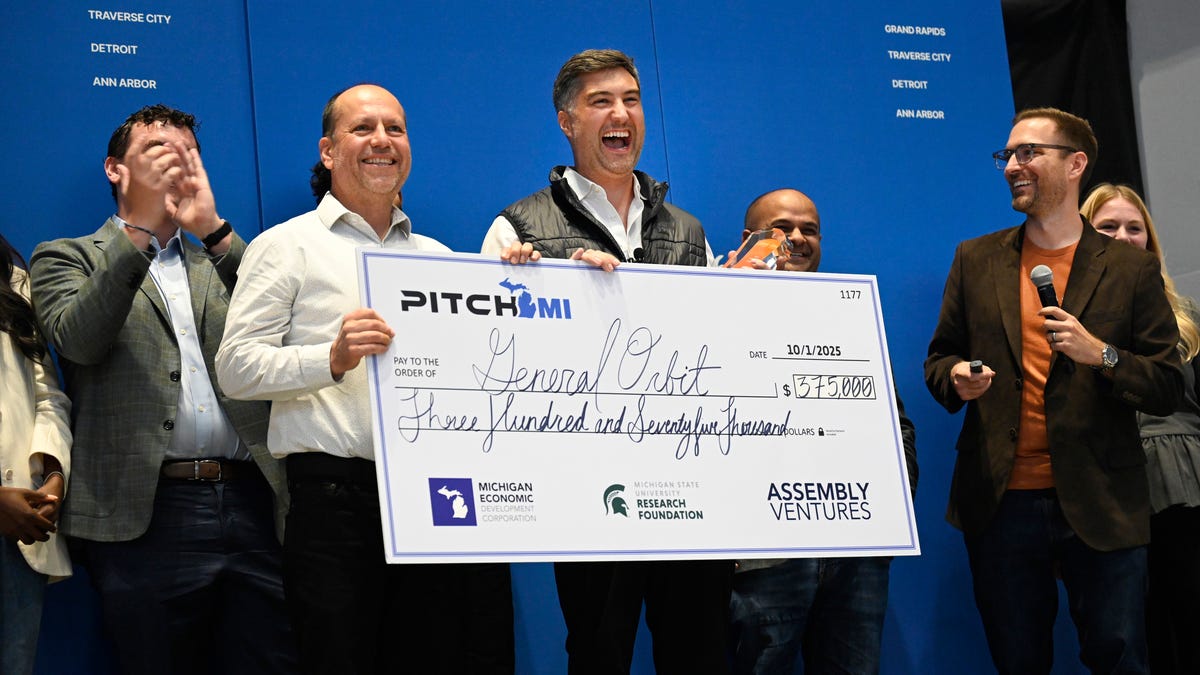Detroit — More satellites likely will orbit into space after a startup uses $375,000 in grant funds it won at a statewide pitch competition aimed at promoting fledgling Michigan businesses.
Birmingham-based General Orbit is one of multiple businesses getting a financial boost through PitchMI, an entrepreneurial fund for early-stage companies hosted by Michigan State University’s Research Foundation and the Michigan Economic Development Corporation.
Also receiving $250,000 each: health care and life sciences business BedConnect of Ann Arbor and cleantech and outdoor innovation startup Electric Outdoors based in Detroit. On Wednesday, General Orbit — which says it designs and builds next-generation satellite systems that simplify production — won the mobility, defense and advanced manufacturing round at Detroit’s Ford Field. And on Friday, the regional competition will conclude after an AI and software startup wins $250,000 at an event in Ann Arbor.
“We make satellite components, very expensive, very complicated, so this is going to be huge for us,” General Orbit co-founder Parker Boundy said at Ford Field after pitching the company’s plans for making satellites faster and cheaper. Boundy and the three other finalists will advance to a state-level competition in April 2026 to compete for an additional $1 million.
PitchMI is among the programs in Metro Detroit and statewide that are doling out cash to startups and other fledgling businesses as part of efforts to promote entrepreneurship and back innovation in a state eager to modernize its image as a manufacturing-and-smokestacks state.
Last month, tens of thousands of dollars went to startups across southeast Michigan through pitch competitions like the Digital Empowerment Summit held by Black Tech Saturdays, which granted a total of $175,000 to six tech businesses.
Christianne Malone, chief program officer at TechTown and assistant vice president at Wayne State University’s Division of Entrepreneurship and Economic Development, said there has been a gap in funding for second-stage businesses no longer considered true start-ups.
So this month, four second-stage businesses will be awarded a total of $110,000 to help them scale up. Detroit Elevate, a project of TechTown Detroit and the Gilbert Family Foundation, is designed for businesses that are 3 to 29 years old. It complements the Detroit Legacy Business Project, which targets businesses over 30 years old with resources for operation, promotion and marketing as well as grant funding.
“There’s a lot more attention, it’s the shiny new object for startups, but for those that have been around three, five, plus years, the resources are there, but they’re not as easily recognizable or specifically targeted in a way that these business owners know that this is for them,” Malone said. “It takes a village to raise a small business.”
Attendees of Detroit Elevate, a pilot program funded for two years with a $950 million investment from the Gilbert Family Foundation, participated in a three-day cohort that concluded Thursday. Forty-four small businesses based in Detroit, Hamtramck and Highland Park received technical assistance and loan readiness support.
From that group, four businesses will be selected in November for awards of $50,000, $30,000, $20,000 and $10,000 following a showcase on Oct. 29 at Eastern Market.
“The grant funding is nice and it’s something that helps out, but we know that it takes a lot more for businesses to best be able to leverage whatever form of capital that they’re able to obtain, whether it’s through loans or lines of credit or maybe a grant … (for) hiring, retainment policies and a culture that helps them continue to scale and leverage the business,” Malone said.
At the PitchMI competition, hundreds of local founders, venture capitalists and other investors took advantage of the opportunity to network — a key technique for startups to make connections with potential investors and would-be funders.
Mario Rodriguez Garcia, co-founder of Detroit-based Soldadera Coffee, attended the pitch competition to meet angel investors and venture capitalists, as his coffee/herbal tea business is in the pre-seed stage. He said events like PitchMI show how capital is becoming more accessible than it was in 2018 when he started his Mexican Revolution-inspired business.
“The startup ecosystem was good enough to get you somewhere, but it wasn’t good enough to get you to the next level,” Garcia said. Through networking at similar events, he discovered that demonstrating to investors that his business could scale was essential to capture their attention.
“The angels or the pre-seed company are very picky or they’re not there … but I’m slowly seeing now the resurgence of that gap that’s missing,” he said. “(Investors) … are trying to put the money in for entrepreneurs to bring these ideas and generate jobs and make money. That’s how I have digested the environment of the startup world right now.”
Boundy at General Orbit says the money his satellite company received at the pitch competition will help it launch — literally and figuratively.
“Before we sell anything, we have to get it in space, so this is going to be huge for us to be able to unlock opportunities with some customers who are really excited about it,” he said. “But they don’t want to buy it quite yet.”
mjohnson@detroitnews.com
@_myeshajohnson
